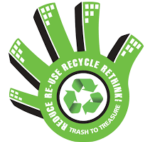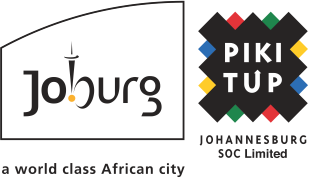Separation @ Source
Pikitup’s Separation@Source programme encourages residents to separate their waste at their homes utilising a ‘3-receptacle model’. In addition to the regular black bin, each household that forms part of the programme is issued with a reusable bag for paper and a clear bag for other types of recyclables. This means that only waste that cannot be recycled ends up in the black bins. Piloted by Pikitup in September 2009 at the Waterval Depot, the programme now covers about 490 000 households.
In the 2014/15 financial year, 20 808 tons of dry waste (i.e. paper, plastic, glass, cans) were successfully diverted away from landfill sites by means of the Separation@Source programme, compared to 15 000 tons in the previous financial year.
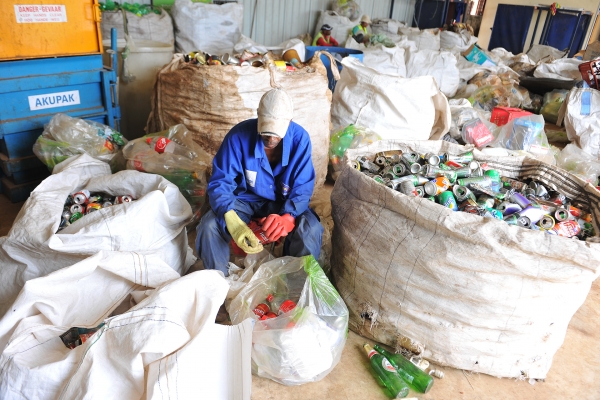
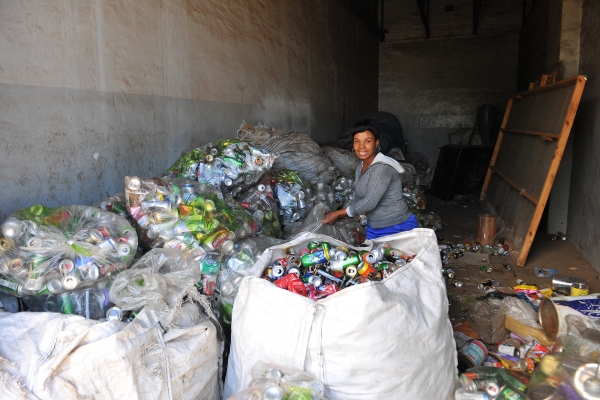
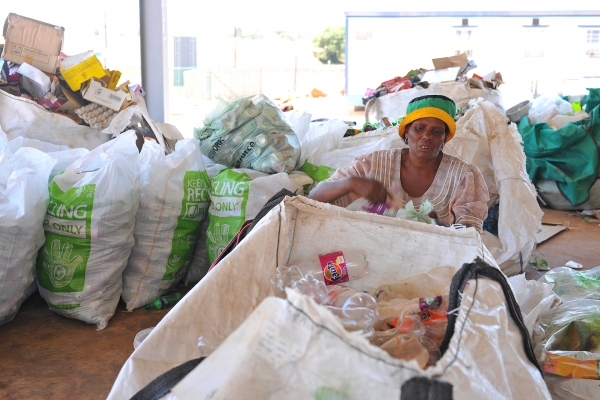
Separating recyclable materials – glass, paper, metals and certain plastics – out of the waste stream reduces the amount f waste going to landfills, eases the strain on South Africa’s natural resources, and helps to create employment in both the informal and formalised waste reclamation sectors. Twenty-four co-operatives have been set up and over 1 000 job opportunities created, representing a significant contribution to the City of Johannesburg’s job creation targets.
During the 2013/14 financial year 25 caged trucks with crew cabins were delivered and deployed to the depots participating in the Separation@Source programme. Existing co-operatives are using these trucks to collect recyclable waste separated at source throughout the city. The vehicles can also be used as mobile buy-back centres, which forms an integral part of the Separation@Source programme.
Pikitup works with established recycling companies, such as PETCO, The Glass Recycling Company and Collect-a-Can, to advise them on how to separate waste in such a way that it generates the most value for the individuals involved in the recycling process. For example, in future co-operatives may be organised in such a way that they focus on a specific waste stream – such specialisation could make it easier to find ways in which to add value to that particular stream.
The established players in the recycling economy also assist Pikitup in launching and supporting recycling initiatives, particularly at community level. In turn, Pikitup’s support has been vital in the establishment of seven community-run recycling buy-back centres located across the city, and more centres are planned for the future.
Existing co-operatives are continuously collaborating with reclaimers, where reclaimers are collecting from households with the bags provided through the programme. Reclaimers are also encouraged to sell the material to the Separation@Source buy-back centres. The Zondi buy-back centre alone has grown its turnover of about R15 000 per month to R300 000 per month thanks to Pikitup’s Separation@Source initiatives.
Pikitup has witnessed the economic impact of the programme and the way in which it empowers individuals first-hand. There are however challenges that face the programme and these include sorting facilities. There is a need for decentralised sorting facilities that are as close as possible to the areas where the recycled waste is being collected, thus reducing transport costs. But that requires environmental impact studies and community involvement. Communities have a ‘not in my backyard’- attitude to these issues and Pikitup needs to conduct a lot of education and awareness to overcome this pushback.
Skills development also requires attention. The individuals who form co-operatives are generally not well-versed in business skills. There is a big challenge in changing people’s mindsets to work according to business principles as opposed to the instant gratification way of working that they have been used to. In practical terms it means changing a person’s way of doing business from simply collecting and selling waste to get money that is theirs to keep, to adopting a longer-term view of having to put money into a business to pay salaries and grow a business.”
However, due to stakeholder involvement and continuous communication through the reclaimers forum to communicate the benefits of integration and ensuring fears and misconceptions are addressed, 599 new reclaimers were incorporated in the 2014/15 financial year, greatly exceeding the annual target of 300.
The huge percentage of waste pickers and reclaimers who are illegal immigrants – estimates put the figure at 75% of the between 3 000 and 7 000 waste pickers/reclaimers – presents a further challenge to integration as they do not have the necessary personal documentation and status in the country. This challenge requires a broader solution, with the involvement of the relevant State entities and NGOs.
Separation@Source has now been rolled out in the following depots: Zondi, Central Camp, Marlboro, Waterval, part of Avalon (Orange Farm), part of Randburg (Diepsloot) and part of Randburg (Zandspruit) and Southdale. Budget permitting, the target is to upscale the programme city-wide, i.e. all households will have access to Separation@Source service.
As this is a huge task, Pikitup intends to harness the capacity and the energy that exists within the private sector. Therefore, Pikitup will collaborate with private operators and community enterprises to ensure that the programme is introduced to all new areas.
In terms of opportunities, industrialists and private business need to come up with new ways of turning recyclables into valuable commodities or improving on existing recycling processes. In this way they can make a valuable contribution towards establishing a first-rate recycling economy in Johannesburg.
